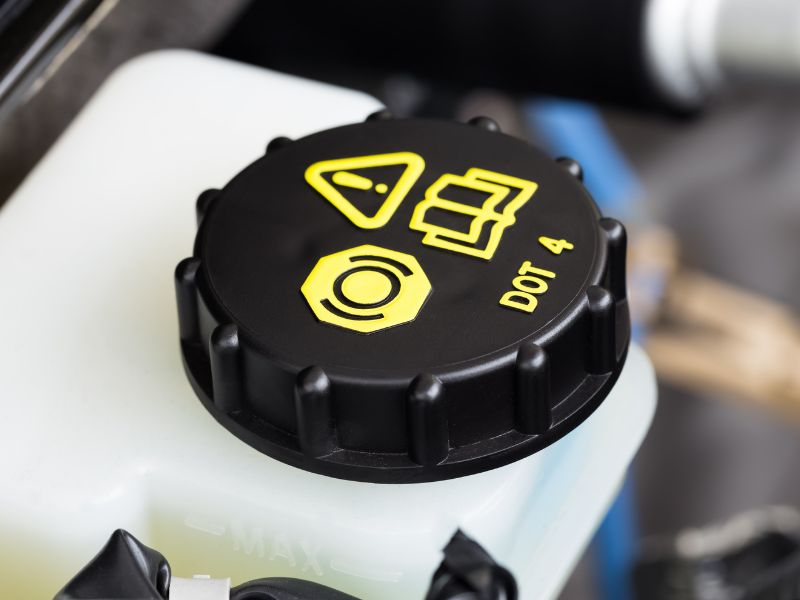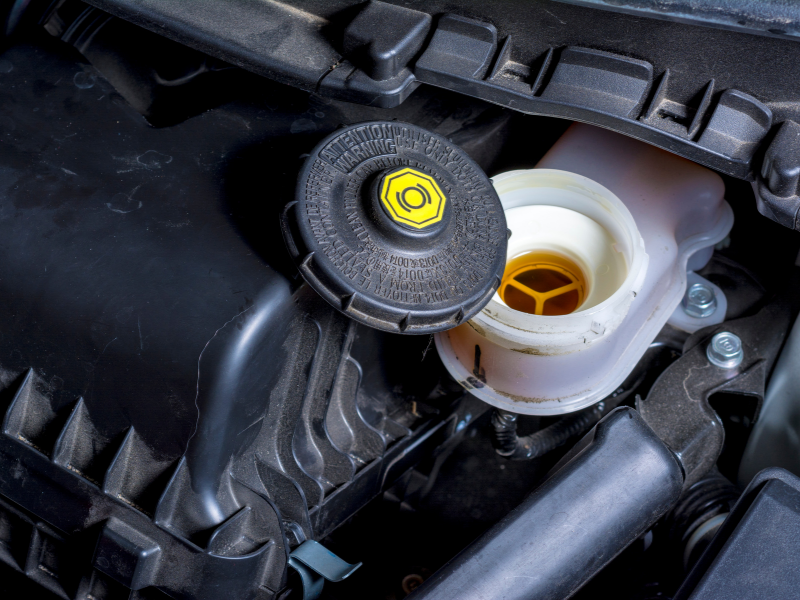What are Brake Fluids and when is the right time to change them?
Brake fluid is a type of fluid used in hydraulic brake and hydraulic clutch applications in vehicles. It is used to transfer force into pressure and to amplify braking force. Stated, when you apply your foot to the brake pedal, brake fluid transmits this force into pressure to the front and rear brakes and stops the vehicle. It works because liquids are incompressible. Brake fluids must have certain characteristics and meet specific quality standards for the braking system to work correctly. It must have a high boiling point to avoid vaporizing within the lines. Vaporization is a problem because the vapour is highly compressible relative to liquid, and therefore negates the hydraulic transfer of braking force, resulting in the brakes failing to stop the vehicle.
Read more to understand how brake fluid works, what the types are and how one can check it in their car.

How does Brake Fluid work?
The brake fluid remains essential in promoting efficiency in the car’s hydraulic brake system. Therefore, if the fluid levels are low or the liquid contains moisture, or its flow is affected, it may impede the car’s braking.
How do you check your car’s brake fluid?
You can check the fluid by checking its level. You can find the translucent hydraulic plastic reservoir that stores the fluid.
Beware that opening the cap may expose the juice to moisture, and you will want to avoid affecting its effectiveness unless you are in the presence of a qualified mechanic.
Types of Brake Fluids
There are two types of brake fluids:
- DOT 3, DOT 4, and DOT 5.1 are based on poly glycol compounds.
- DOT 5, based on Silicone.
- DOT 3, 4 and 5.1 fluids are hygroscopic and glycol-based, which absorb moisture from the atmosphere. Glycol-based brake fluid absorbs water when put in the hydraulic brake system or exposed to the air. The fluid attracts moisture through microscopic pores in rubber hoses, past seals, and exposure to the atmosphere. As water enters the system, instead of pooling in low spots, it is dispersed throughout the whole of the brake fluid due to its weight compared to brake fluid.

It helps to keep the boiling point of the entire brake fluid high rather than having pools of water in the system, which will boil much sooner than the rest of the brake fluid.
The difference between DOT 3, 4 and 5.1 is the boiling point. The higher the boiling point, the more heat and abuse the fluid can take. Therefore, regarding these three glycol-based fluids, DOT 3 has the lowest boiling point and DOT 5.1 the highest.
- DOT 5 fluid is hydrophobic and Silicone-based, which means that it tends to repel water. Silicone fluid does not absorb moisture from the surrounding atmosphere while in service. It, therefore, offers greatly extended service life whilst improving the corrosion resistance of the main components of the braking system.Silicone-based DOT 5 gives higher temperature performance over glycol DOT 4; however, because it is Silicone-based, it does not lubricate ABS pumps as well as glycol-based fluids.
When do you change your Brake fluid?
Like other car fluids such as coolant and oil, the brake fluid requires change mainly because it loses its effectiveness over time. The latter is possible if the hydraulic system has corrupted or if the fluid absorbs moisture. Such effects decrease its energy to stop the car when the driver steps on the brakes. In this perception, changing your car’s brake fluid remains essential in enhancing its braking effectiveness. Unfortunately, there exists no standard period for changing the vehicle’s brake fluid.
Renowned manufacturers such as Mercedes Benz, Honda, and Chevrolet recommend that you change your brake fluid after 20,000 miles, three years, and 45,000 miles, respectively. Manufacturers for cars such as Hyundai Elantra and Toyota Camry do not specify their cars’ clear fluid changing interval. However, they recommend constant monitoring for the following signs:
- Notice the ABS light
- Experience pedal problems
- Hear strange noises
- Smell anything strange

Brake fluid is essential for the safe operation of your vehicle. Make brake fluid a part of your regular maintenance routine, and replace the brake fluid when necessary to keep you and your passengers safe.


